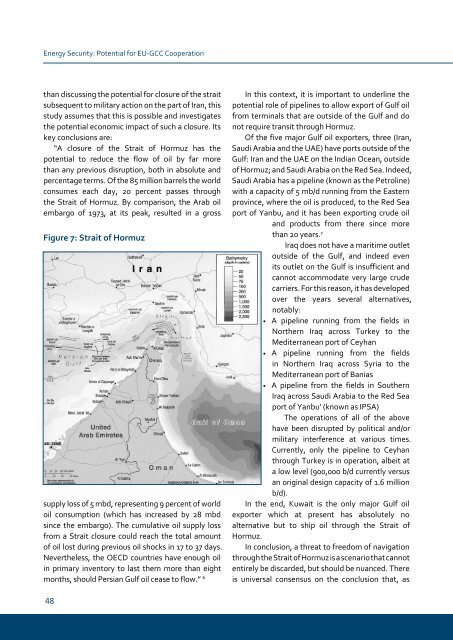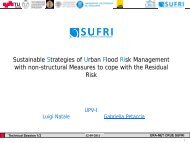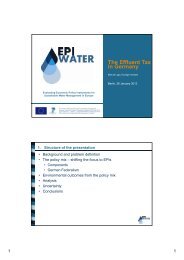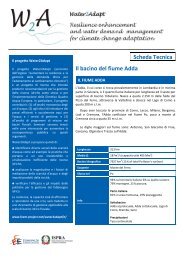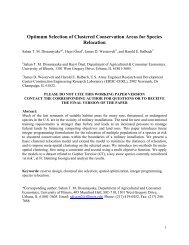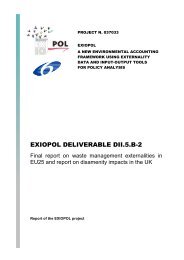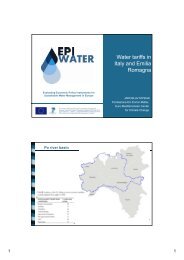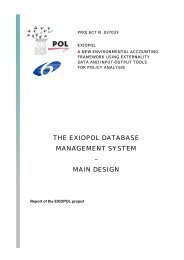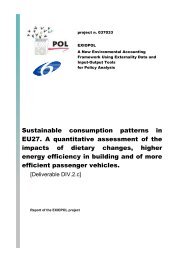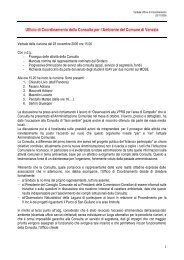Gulf and European Energy Supply Security - Feem-project.net
Gulf and European Energy Supply Security - Feem-project.net
Gulf and European Energy Supply Security - Feem-project.net
Create successful ePaper yourself
Turn your PDF publications into a flip-book with our unique Google optimized e-Paper software.
<strong>Energy</strong> <strong>Security</strong>: Potential for EU-GCC Cooperation<br />
than discussing the potential for closure of the strait<br />
subsequent to military action on the part of Iran, this<br />
study assumes that this is possible <strong>and</strong> investigates<br />
the potential economic impact of such a closure. Its<br />
key conclusions are:<br />
“A closure of the Strait of Hormuz has the<br />
potential to reduce the flow of oil by far more<br />
than any previous disruption, both in absolute <strong>and</strong><br />
percentage terms. Of the 85 million barrels the world<br />
consumes each day, 20 percent passes through<br />
the Strait of Hormuz. By comparison, the Arab oil<br />
embargo of 1973, at its peak, resulted in a gross<br />
Figure 7: strait of Hormuz<br />
supply loss of 5 mbd, representing 9 percent of world<br />
oil consumption (which has increased by 28 mbd<br />
since the embargo). The cumulative oil supply loss<br />
from a Strait closure could reach the total amount<br />
of oil lost during previous oil shocks in 17 to 37 days.<br />
Nevertheless, the OECD countries have enough oil<br />
in primary inventory to last them more than eight<br />
months, should Persian <strong>Gulf</strong> oil cease to flow.” 6<br />
4<br />
In this context, it is important to underline the<br />
potential role of pipelines to allow export of <strong>Gulf</strong> oil<br />
from terminals that are outside of the <strong>Gulf</strong> <strong>and</strong> do<br />
not require transit through Hormuz.<br />
Of the five major <strong>Gulf</strong> oil exporters, three (Iran,<br />
Saudi Arabia <strong>and</strong> the UAE) have ports outside of the<br />
<strong>Gulf</strong>: Iran <strong>and</strong> the UAE on the Indian Ocean, outside<br />
of Hormuz; <strong>and</strong> Saudi Arabia on the Red Sea. Indeed,<br />
Saudi Arabia has a pipeline (known as the Petroline)<br />
with a capacity of 5 mb/d running from the Eastern<br />
province, where the oil is produced, to the Red Sea<br />
port of Yanbu, <strong>and</strong> it has been exporting crude oil<br />
<strong>and</strong> products from there since more<br />
than 20 years. 7<br />
Iraq does not have a maritime outlet<br />
outside of the <strong>Gulf</strong>, <strong>and</strong> indeed even<br />
its outlet on the <strong>Gulf</strong> is insufficient <strong>and</strong><br />
cannot accommodate very large crude<br />
carriers. For this reason, it has developed<br />
over the years several alternatives,<br />
•<br />
notably:<br />
A pipeline running from the fields in<br />
Northern Iraq across Turkey to the<br />
Mediterranean port of Ceyhan<br />
• A pipeline running from the fields<br />
in Northern Iraq across Syria to the<br />
Mediterranean port of Banias<br />
• A pipeline from the fields in Southern<br />
Iraq across Saudi Arabia to the Red Sea<br />
port of Yanbu’ (known as IPSA)<br />
The operations of all of the above<br />
have been disrupted by political <strong>and</strong>/or<br />
military interference at various times.<br />
Currently, only the pipeline to Ceyhan<br />
through Turkey is in operation, albeit at<br />
a low level (900,000 b/d currently versus<br />
an original design capacity of 1.6 million<br />
b/d).<br />
In the end, Kuwait is the only major <strong>Gulf</strong> oil<br />
exporter which at present has absolutely no<br />
alternative but to ship oil through the Strait of<br />
Hormuz.<br />
In conclusion, a threat to freedom of navigation<br />
through the Strait of Hormuz is a scenario that cannot<br />
entirely be discarded, but should be nuanced. There<br />
is universal consensus on the conclusion that, as


